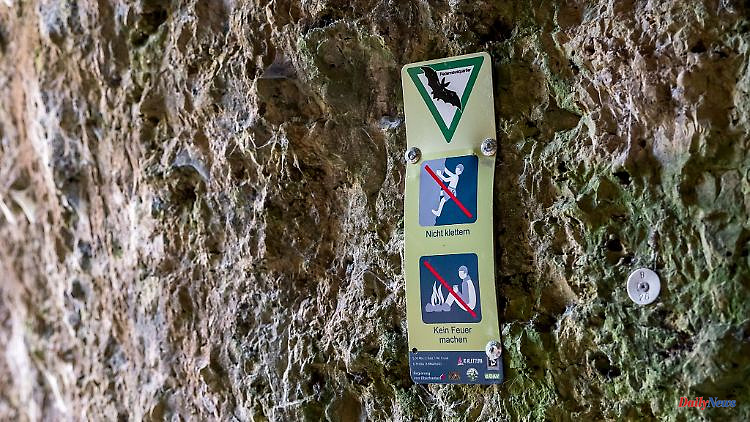Franconia's mysterious caves are winter quarters for many endangered species of bats. Therefore, the caves may not be entered from October to March - actually. Many people are not even aware of this legal regulation.
Ahorntal (dpa / lby) - For many endangered bat species, the caves in northern Bavaria are an important retreat in winter. But the hibernation sites are in danger. Experts therefore urge caution: According to the law, there is a ban on entering caves in the winter months. You have to sensitize the population, said the biologist Alexander Gnatz from the State Association for Bird and Nature Conservation in Bavaria (LBV). "Bats need protection. If they are disturbed during the winter months, it can kill them."
Because especially since the Corona pandemic, when many people discovered the local nature as a destination for themselves, there has been a lot going on on the hiking trails of Franconian Switzerland with its countless caves. And caves are also interesting in the cold season because of their constant temperature or because of icing at the entrance.
But they must not be entered in order not to disturb the bats. "Bats reduce their metabolism during hibernation," explained Gnatz. "If they are woken up, it takes a lot of energy." At the same time, people would often not even notice that bats disturbed them during a winter walk into a cave. "It takes a while for the bat to wake up. By then the human has long since left the cave."
Depending on the bat species, different quarters would be used, said the expert. Some species crawl into the smallest holes and crevices in the rocks, while the greater horseshoe bat hangs freely from the ceiling and therefore needs caves more than three meters high - and these are particularly easy to enter. However, this extremely endangered species spends most of the winter on the Hohenfels military training area and is therefore shielded from the population.
Last autumn, the Franconian Switzerland - Frankenjura Nature Park, together with cooperation partners, began to put up warning signs on caves to draw attention to the ban on entry. Although caves are important excursion destinations, they are also valuable habitats for animals, said the district president of Upper Franconia, Heidrun Piwernetz, at the start of the campaign in the Ahorntal (Bayreuth district).
The State Association for Cave and Karst Research is also there: You can now observe the further development of the signposted caves, said Martin Harder, officer for bat protection. Now the annual bat winter monitoring at important caves in Bavaria is imminent. Of course, one is very curious to see whether caves have been entered despite the ban. Indications for this are, for example, new fireplaces.
During the monitoring, experts try to get an overview of the number of bats overwintering in the caves.
Installing barriers such as bars at cave entrances is problematic, Harder said. "Barring can have sensitive effects on the function as a bat habitat. In addition, these would often also be ugly interventions in existing natural monuments." Particularly important bat roosts would have to be protected beyond March until the end of April. We therefore ask "the diverse caving scene" to observe the applicable regulations. In Germany, many bat species are strictly protected because they are threatened with extinction.












